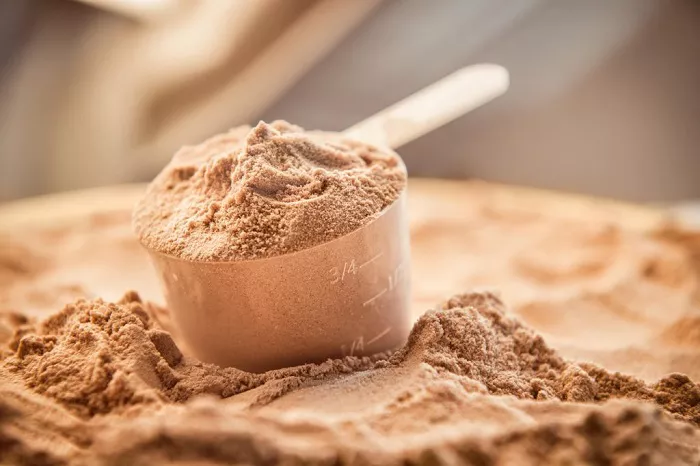Protein powder is a popular dietary supplement that is used by athletes, bodybuilders, and fitness enthusiasts to increase muscle mass and improve overall health. It is typically made from whey, casein, soy, or pea protein and is available in a variety of flavors and forms. In this article, we will explore the benefits and risks of supplementing with protein powder and the science behind its effects on health and fitness.
Protein Powder and Muscle Building
One of the primary reasons that individuals use protein powder is to increase muscle mass and improve strength. Protein is essential for building and repairing muscle tissue, and consuming adequate amounts of protein is important for individuals who engage in regular exercise.
Protein powder can be a convenient and efficient way to increase protein intake, particularly for individuals who struggle to consume enough protein through whole foods alone. By providing a concentrated source of protein, protein powder can help support muscle growth and repair.
Protein Powder and Weight Loss
In addition to its effects on muscle building, protein powder may also be beneficial for weight loss. Protein is known to be more satiating than other macronutrients, meaning that it can help reduce hunger and prevent overeating.
By increasing feelings of fullness and reducing the likelihood of overeating, protein powder may help individuals consume fewer calories overall, leading to increased weight loss. Additionally, consuming protein powder may help preserve lean muscle mass during weight loss, which can help increase overall calorie burn and make it easier to maintain a healthy weight.
Protein Powder and Recovery
Another potential benefit of protein powder is its ability to aid in muscle recovery after exercise. Protein is essential for tissue repair and muscle growth, and consuming protein after exercise can help promote muscle recovery and growth.
Additionally, some research suggests that consuming protein before exercise may help improve endurance and reduce muscle damage. By providing a concentrated source of protein, protein powder can be a convenient and effective way to support muscle recovery and improve exercise performance.
Protein Powder and Nutrient Density
Protein powder can also be a convenient way to increase nutrient density in the diet. Many protein powders are fortified with vitamins and minerals, and some even contain additional ingredients such as probiotics, fiber, and antioxidants.
By consuming protein powder, individuals can increase their nutrient intake and potentially improve overall health and well-being. However, it’s important to choose a high-quality protein powder that is free from added sugars and artificial ingredients.
Risks of Protein Powder
While protein powder can be a beneficial dietary supplement, it’s important to be aware of the potential risks associated with its use. One potential risk is the consumption of excessive amounts of protein, which can place a strain on the kidneys and lead to kidney damage over time.
Additionally, some protein powders may be contaminated with heavy metals, such as lead and cadmium, which can be harmful to health. It’s important to choose a high-quality protein powder that has been independently tested for purity and quality.
Choosing a Protein Powder
When choosing a protein powder, it’s important to consider factors such as protein content, ingredient quality, and flavor. Whey protein is a popular option, as it is a complete protein that is easily digested and absorbed by the body.
However, individuals who are lactose intolerant or follow a vegan diet may prefer plant-based protein powders, such as soy, pea, or rice protein. It’s important to choose a protein powder that fits your individual dietary needs and preferences.
Protein Powder and Overall Diet Quality
Finally, it’s important to note that protein powder should be consumed as part of a balanced and nutrient-dense diet. While protein powder can be a convenient and effective way to increase protein intake, it should not be used as a substitute for whole foods.
Consuming a variety of nutrient-dense foods, such as fruits, vegetables, whole grains, and lean protein sources, is essential for overall health and well-being. By incorporating protein powder into a balanced and nutrient-dense diet, individuals can support their health and fitness goals while also promoting overall health and well-being.
Conclusion
Protein powder can be a convenient and effective way to increase protein intake and support muscle growth, weight loss, and exercise performance. However, it’s important to choose a high-quality protein powder that is free from added sugars and artificial ingredients and to consume it as part of a balanced and nutrient-dense diet.
Additionally, it’s important to be aware of the potential risks associated with protein powder use, such as kidney damage and heavy metal contamination. By choosing a high-quality protein powder and incorporating it into a balanced and nutrient-dense diet, individuals can support their health and fitness goals while also promoting overall health and well-being.
[inline_related_posts title=”You Might Be Interested In” title_align=”left” style=”list” number=”6″ align=”none” ids=”4211,4209,3850″ by=”categories” orderby=”rand” order=”DESC” hide_thumb=”no” thumb_right=”no” views=”no” date=”yes” grid_columns=”2″ post_type=”” tax=””]
































